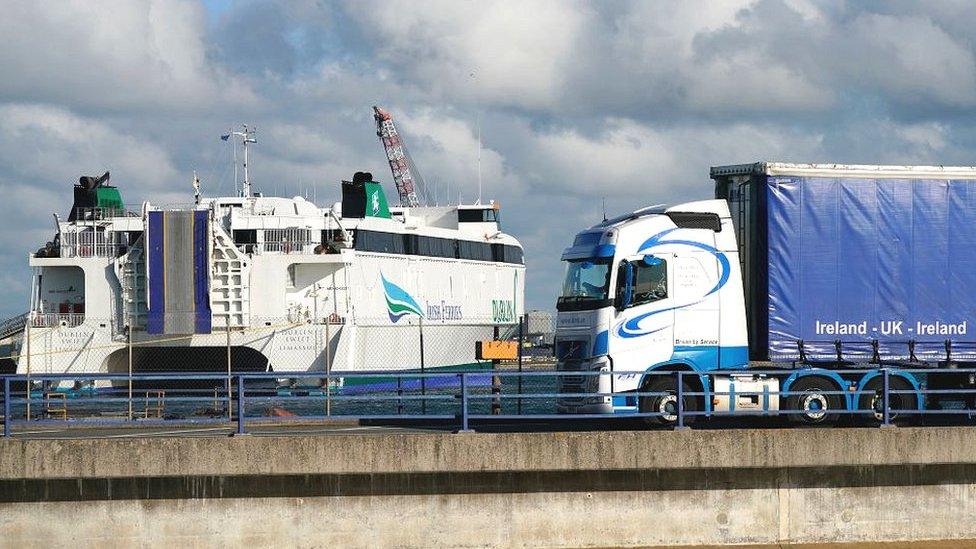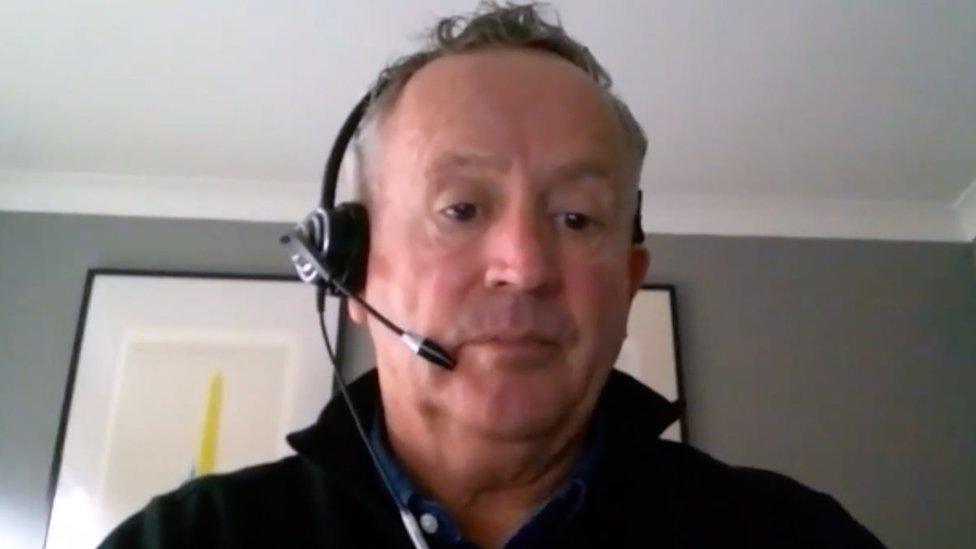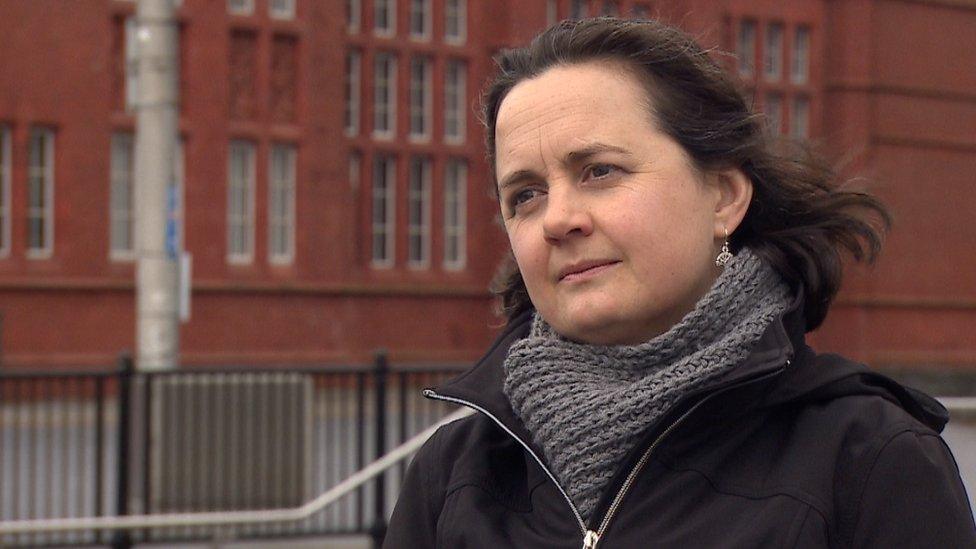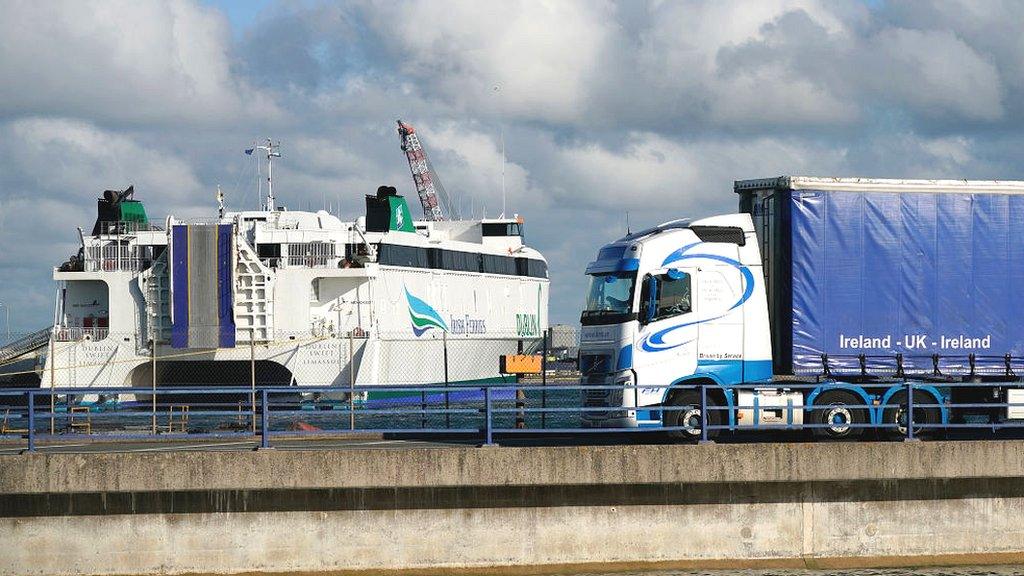Brexit: Welsh exports to Irish Republic 'hindered by wrong ink'
- Published
- comments

Exports to Ireland are being blocked by extra paperwork and costs at customs, say CBI Wales
Welsh exports to Ireland are being blocked by extra paperwork and costs at customs, says CBI Wales.
Director Ian Price said the authorities in the Republic of Ireland were "zealous" when checking goods which was "causing some delays."
He said documents had been rejected for being written in blue not black ink.
Ireland's consul general in Wales insisted the Irish Government was "focused" on facilitating trade between the two countries.
Mr Price called for "consistency of approach" when exporting to the EU.
The republic is Wales' fourth biggest export market, behind Germany, France and the US and the fifth largest market for the UK.
Trade worth £20bn goes back and forth across the Irish Sea every week.
But since 1 January, there has been a drop in UK-Ireland traffic at Holyhead and Pembroke Dock.

CBI Wales' director Ian Price said documents had been rejected for being written in blue rather than black ink
Mr Price said it's difficult to tell whether this was down to companies "biding their time" because they foresaw problems or if it is "a genuine change in the way people are moving their goods."
"There's no denying costs of freight have increased quite largely and it's hard to judge at the moment, whether this is a temporary glitch, or whether this is something that is with us for good," he explained.
"Quite clearly there's a lot more administration involved now we're moving goods from ourselves into mainland Europe and as a consequence, it requires more people, requires more time or documentation and that in itself creates a cost."
This was "a burden" being absorbed by UK businesses, he said.

Ireland's consul general in Wales, Denise Hanrahan said the Brexit changes were a "steep learning curve"
Ireland's consul general in Wales, Denise Hanrahan said: "Ireland and Wales are so closely tied, our shared Irish sea border is one of the vital links between us.
"The UK has left the EU customs union, has left the single market, and that inevitably requires then systems to be put in place to manage the customs, the health aspects, the animal safety aspects.
"All of those normal aspects of trading."
Ms Hanrahan said it was a "steep learning curve."
The Irish Government was supporting businesses "to learn as much as possible as to how they can best interact with those systems."
Josh Burbidge, managing director of 150-year-old family firm Archwood Group, says the Irish market is "significant".
It is worth more than £600,000 in annual revenue to the business, based in Chirk, Wrexham, he said.

Archwood's Josh Burbidge said his firm won't be able to absorb extra costs in the long term
"We made the conscious decision to stop exporting anything to Ireland for two weeks at the start of January to help with the paperwork, and ensure that we had everything sorted in terms of all of the regulation," he explained.
Deliveries have recently been delayed by six weeks and while currently absorbing extra costs, the firm cannot do so forever.
"Every pallet we send in as an extra £65, and every consignment or individual parcel is £6.50," he said.
"We're not in a high margin business. Therefore, we won't be able to continue absorbing those costs on the longer term."
'Prices unrealistic'
Wrexham Lager sales manager Joss Roberts, said Brexit complications were having a "major impact", despite the majority of business comes from the UK.
"Prices are becoming unrealistic," said Mr Roberts.
"We've had to cancel three Irish orders this morning because the end receiver is expected to pay €11.50 per crate, that's on top of an admin courier fee.
"It's gone up around £17 alone to the Republic of Ireland where as to the likes of Spain it's gone up over €60 a crate."

Wrexham Lager will "have to work out a way" said sales manager Joss Roberts
He has written to customers to warn them of the extra fees.
The business will "have to work out a way."
He said: "Do they ring us and pay the extra over the phone? Do we put an extra addition on our cost on the website? It's hassle that from December wasn't there."
"We just hope it can get better soon."
Related topics
- Published2 February 2024

- Published21 January 2020

- Published12 February 2021
